实义动词的练习专题复习
(16)实义动词的各种用法专练
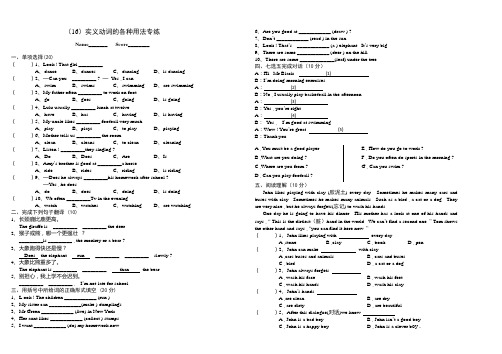
(16)实义动词的各种用法专练Name_______Score________一、单项选择(20)()1、Look ! That girl _________ .A、danceB、dancesC、dancingD、is dancing ()2、—Can you _________ ? —Yes , I can .A、swimB、swimsC、swimmingD、are swimming ()3、My father often _________ to work on foot .A、goB、goesC、goingD、is going()4、Lulu usually _________ lunch at twelve.A、haveB、hasC、havingD、is having ()5、My uncle likes _________ football very much .A、playB、playsC、to playD、playing()6、Mother tells us _________ the room .A、cleanB、cleansC、to cleanD、cleaning()7、Listen ! _________they singing ?A、DoB、DoesC、AreD、Is()8、Amy’s brother is good at _________a horse .A、rideB、ridesC、ridingD、is riding()9、—Does he always _________his homework after school ?—Y es , he does .A、doB、doesC、doingD、is doing()10、We often _________Tv in the evening .A、watchB、watchesC、watchingD、are watching二、完成下列句子翻译 (10)1、长颈鹿比鹿更高。
实义动词的练习材料 专题复习

实义动词的练习材料专题复习---
一、选择题
1. 下列句子中,实义动词是:
- A. 我们的学校有一个美丽的操场。
- B. 她在椅子上坐了一整天。
- C. 小明的爱好是跳舞。
- D. 他们在晚上聚在一起唱歌。
2. 在下列句子中,哪个词是实义动词?
- A. 他们经常去购物中心逛街。
- B. 她送了一束鲜花给她的朋友。
- C. 这个问题的答案是十四。
- D. 我的狗喜欢在花园里奔跑。
3. 下列句子中,实义动词是:
- A. 请你把这个包裹递给她。
- B. 我们家的房子很大。
- C. 我的电脑坏了,需要修理。
- D. 那个小女孩从桌子上掉下来了。
---
二、填空题
1. 我们明天一起去公园,好吗?(走/等/看/做)
2. 她在镜子前整理自己的衣服。
(对/看/戴/听)
3. 爸爸在河边钓鱼。
(玩/走/说/坐)
4. 他买了一本新书。
(读/提/写/放)
5. 我们要一起度过美好的假期。
(吃/过/学/带)
---
三、简答题
1. 请举一个实义动词的例子,并简要解释其意思。
2. 实义动词与非实义动词有什么区别?请举例说明。
3. 你在日常生活中常使用哪些实义动词?请列举一些。
---
四、综合题
请写一个句子,包括一个实义动词和一个形容词,描述一个你喜欢的食物。
---
以上是实义动词的练材料专题复。
希望对你的研究有所帮助!。
实义动词的练习题目 专题复习
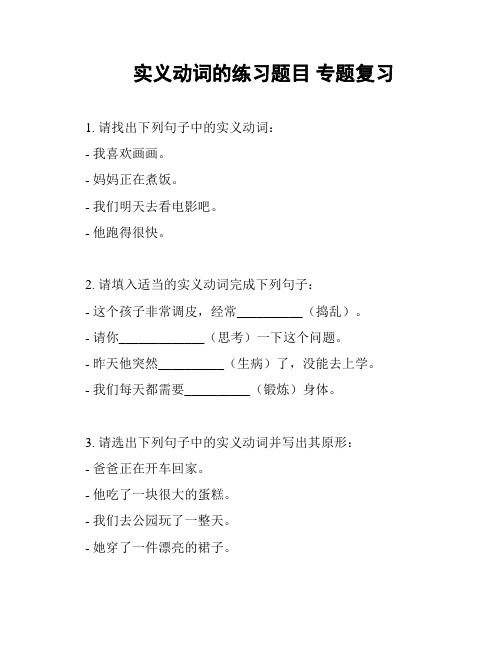
实义动词的练习题目专题复习
1. 请找出下列句子中的实义动词:
- 我喜欢画画。
- 妈妈正在煮饭。
- 我们明天去看电影吧。
- 他跑得很快。
2. 请填入适当的实义动词完成下列句子:
- 这个孩子非常调皮,经常__________(捣乱)。
- 请你_____________(思考)一下这个问题。
- 昨天他突然__________(生病)了,没能去上学。
- 我们每天都需要__________(锻炼)身体。
3. 请选出下列句子中的实义动词并写出其原形:
- 爸爸正在开车回家。
- 他吃了一块很大的蛋糕。
- 我们去公园玩了一整天。
- 她穿了一件漂亮的裙子。
4. 请用合适的实义动词填空:
- 我们需要_________(研究)新知识。
- 他不愿意___________(分享)自己的玩具。
- 请你_________(帮助)我找到一本书。
- 我们计划_____________(旅行)去海边。
5. 请根据句意选择正确的实义动词填入空格:
- 昨天晚上,我在家里_________(跳舞)。
- 你能________(带领)我们去图书馆吗?
- 别忘了_________(回答)这个问题。
- 他总是喜欢_________(探索)新的事物。
以上是关于实义动词的练习题目,希望能帮助你复习和巩固所
学的内容。
请仔细阅读题目并完成练习,在文档最后写出你的答案。
祝你成功!。
实义动词练习题专升本
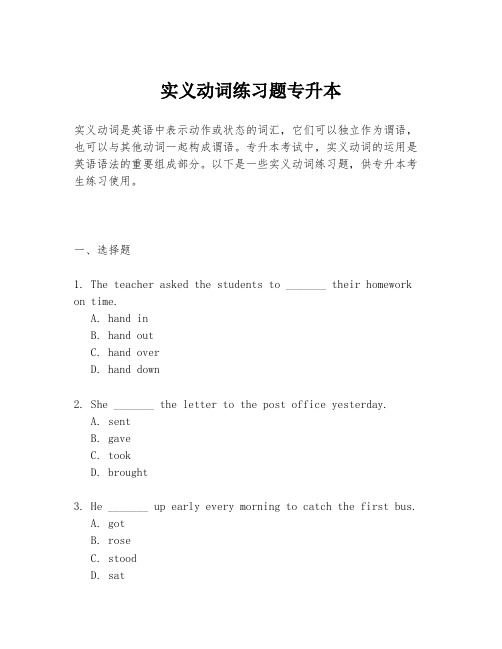
实义动词练习题专升本实义动词是英语中表示动作或状态的词汇,它们可以独立作为谓语,也可以与其他动词一起构成谓语。
专升本考试中,实义动词的运用是英语语法的重要组成部分。
以下是一些实义动词练习题,供专升本考生练习使用。
一、选择题1. The teacher asked the students to _______ their homework on time.A. hand inB. hand outC. hand overD. hand down2. She _______ the letter to the post office yesterday.A. sentB. gaveC. tookD. brought3. He _______ up early every morning to catch the first bus.A. gotB. roseC. stoodD. sat4. The company _______ a new product last month.A. launchedB. introducedC. presentedD. offered5. I _______ the book from the library last week.A. borrowedB. lentC. keptD. returned二、填空题6. The children _______ (play) in the park when it started to rain.7. He _______ (not finish) his homework before the class began.8. She _______ (study) abroad last year.9. They _______ (plan) to go on a trip next summer.10. The flowers _______ (smell) sweet in the garden.三、改错题11. She is reading a book. (改为过去时)- She read a book.12. They are going to the cinema. (改为过去时)- They went to the cinema.13. He can play the piano. (改为过去时)- He could play the piano.14. We will have a meeting tomorrow. (改为过去时)- We had a meeting yesterday.15. She is learning English. (改为过去时)- She was learning English.四、翻译题16. 他昨天没有完成作业。
高考英语专题训练之实义动词

高考专题训练——实义动词1.With more and more forests _______,we must take action to protect our earth.()A.destroying B.destroyedC.to destroy D.are destroyed2.You have changed so much that I can hardly _______you.()A.disagree B.swap C.conquer D.recognize3.The heavy rain has lasted for several days and the river has____________ by 30 centimeters.()A.risen B.raised C.arisen D.lifted4.I'm busy now.I'm sorry I can't help ______ the flower.()A.watering B.watered C.waters D.to water5.The company has been from a family business into a multi﹣million﹣pound operation.()A.transferred B.transformedC.transported D.transmitted6.Dad,shall we have Lisa ________ with us?()A.to go B.go C.went D.gone7.I would rather than in the street.()A.starve;to beg B.to starve;begC.starve;beg D.starved;begged8.I think the door is locked,but I'd better go and make sure it __________.()A.does B.has C.was D.is9.The exam he paid no attention to ________ him the chance to go to college.()A.being cost B.be cost C.costing D.cost10.To enjoy the scenery,I would rather ____ more hours on the train than travel by air.()A.spend B.to spend C.spending D.spent11.You would be unlucky to see sharks,but there is no problem if you don't _____them.()A.divide B.disturb C.discourage D.force12.Who did you see __________ in the middle of the front row __________ that much noise?()A.seated;making B.sit;madeC.sitting;to make D.seating;to make13.I don't like sad movies because it usually makes me ________()A.crying B.cries C.to cry D.cry14.I desire to take the course to _________ my understanding of the history of the country. At the same time,my brother is determined to take a course to _________ his business skills.()A.deep;sharp B.deeply;sharplyC.deepen;sharpen D.depth;sharpness15.At the exit of the high way there is an arrow _____ the direction to the urban area.()A.insuring B.intending C.indicating D.explaining 16.After years of hard work,he ________ a better position in the company.()A.attained B.possessedC.acknowledged D.admitted17.﹣This new dress code ___________to everyone at work,employees and employers alike.﹣Yes,there is no exception.()A.contributes B.submitsC.applies D.adds18.I'm not free tomorrow.I would rather you __________ next weekend()A.had come B.will come C.come D.came 19.Nowadays many people who consider only their own convenience _____ the necessity of keeping the balance of nature,causing great harm to our environment.()A.ignore B.impress C.indicate D.insert20.Our teacher made us a lot of homework after school.()A.to do B.doingC.do D.to have done until21.When you feel on the point of exploding,try to______the focus away from anger by thinking of something pleasant.()A.withdraw B.squeeze C.delete D.switch 22.Though it's hard work,all the students devoted themselves to it,which made me .()A.move B.moving C.to move D.moved23.The newly designed shirt ______ me but the color ______ me well.()A.doesn't fit;fits B.isn't fit for;fitsC.doesn't fit;suits D.isn't fit;suits24.Time is precious.I can't have my son time in this way.()A.to waste B.waste C.wasting D.wasted25.﹣Who are you going to have ________ this letter for you?﹣My secretary.()A.to post B.posted C.post D.posting26.﹣﹣﹣How could she have let something so important _____ her mind?﹣﹣﹣She's fully applied to work recently and gets burnt out.()A.occupy B.cross C.slide D.slip27.Most experts claim that the effects of climate change will make Tuvalu uninhabitable within the next 50 years because many problems are .()A.enhancing B.emerging C.engaging D.extending 28.Yang Liwei is the 438th person _______ in space.()A.to travel B.travellingC.having travelled D.travelled29.As soon as the children were _____,their mother got them out of bed and into the bathroom.()A.woke B.waken C.wake D.awake30.The best solution to_________this task is to unite as many people as we can.()A.undertaking B.performingC.accomplishing D.conducting31.When dealing with people from different cultures,we should seek common ground and ______ differences.()A.register B.reserve C.request D.restore32.﹣﹣Excuse me sir,where is Room 301?﹣﹣Just a minute.I'll have Bob ________you to your room.()A.show B.shows C.to show D.showing 33.Gilbert________electricity and Edison________the electric light bulb.()A.invented;discoveredB.discovered;inventedC.found;inventedD.found out;discovered34.﹣﹣Which would you prefer to do tonight,to go to the cinema or go shopping?﹣﹣Neither,I would rather ________ home.()A.stay B.to stay C.stayed D.staying35.Later you can cover a story and submit the article yourself.()A.include somethingB.spread over a surfaceC.travel the distanceD.report on an event36.Our village is making efforts to________ its development pattern to promote green growth.()A.squeeze B.compromiseC.transform D.differentiate37.﹣Why was Mr. Smith suddenly fired by his boss?﹣Because he was found ________ in the non﹣smoking office.()A.smoking B.smoke C.to smoke D.smoked 38.When the visitors go to such tourist attractions,they still can't help but ______ his painting.()A.admiring B.to admire C.admire D.admired 39.Such behavior will _______ your reputation,so better think before you leap.()A.compromise B.communicateC.compensate D.combine40.The thing that ______ is not who you are ,but what you can do.()A.matters B.cares C.considers D.minds41.She's very strict ﹣we ______ say a word unless she asks us to.()A.dared B.dareC.dared of D.don't dare to42.High interest rates _____ people from borrowing money for buying houses.()A.dismiss B.decrease C.disturb D.discourage 43.She is shy and________ the teacher's question.()A.dares not answerB.doesn't dare to answerC.dare not to answerD.dares not to answer44.Reading can give students a chance to ________ their interests,which,________ enables them to enjoy life more.()A.explain,on the way B.discover,by the wayC.realize,in the way D.explore,in a way45.The National Aquatic Center,or "Water cube",_____ 23﹣year﹣old American Michael Phelps build his swimming kingdom by winning eight gold medals and breaking seven records in single Games.()A.symbolized B.registered C.polished D.saw 46.People are wondering which of the five sons will ___ their father as general manager after his death.()A.follow B.serve C.succeed D.remove47.﹣Is it enough to finish the form for a passport,Madam?﹣Your passport application form should be _____by two recent photos.()A.updated B.accompaniedC.established D.identified48.﹣﹣﹣What do you think of the movie The Wandering Earth reflected in the cinema recently?﹣﹣﹣Just so so.I guess it______ figure description.()A.lacks in B.lacks C.lacks of D.lacks for 49.The milk is reported to have serious side effects and has been ________ from the market for further tests.()A.withdrawn B.cancelled C.renewed D.appointed 50.Who do you guess the head teacher would like to have ________ the speech at the school meeting next week?()A.delivered B.deliver C.to deliver D.delivering参考答案与试题解析1.With more and more forests _______,we must take action to protect our earth.()A.destroying B.destroyedC.to destroy D.are destroyed【分析】随着越来越多的森林遭到破坏,我们必须采取行动去保护我们的地球。
实义动词练习专题复习计划
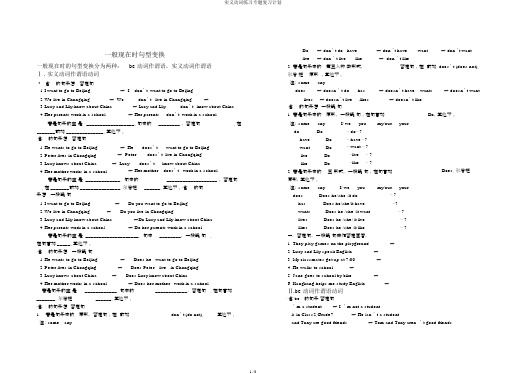
一般现在时句型变换一般现在时的句型变换分为两种:be 动词作谓语,实义动词作谓语Ⅰ . 实义动词作谓语动词· 含的句子怎否定句1.I want to go to Beijing.→ I don’ t want to go to Beijing.2.We live in Chongqing.→ We don’ t live in Chongqing.→3.Lucy and Lily know about China.→ Lucy and Lily don’ t know about China.4.Her parents work in a school.→ Her parents don’ t work in a school.若是句子的主是 __________________, 句中的 ________ ,否定句, 在_______前加 ______________, 其他不。
·含的句子怎否定句1.He wants to go to Beijing.→ He does’ t want to go to Beijing.2.Peter lives in Chongqing.→ Peter does’ t live in Chongqing.3.Lucy knows about China.→ Lucy does’ t know about China.4.Her mother works in a school.→ Her mother does’ t work in a school.若是句子的主是 _____________, 句中的___________________ ,否定句, 在 _______前加 _______________, 尔后把 ______, 其他不。
·含的句子怎一般疑句1.I want to go to Beijing.→Do you want to go to Beijing.2.We live in Chongqing.→Do you live in Chongqing.3.Lucy and Lily know about China.→Do Lucy and Lily know about China.4.Her parents work in a school.→ Do her parents work in a school.若是句子的主是 ____________________, 句中 ________,一般疑句 ,在句首加 _____, 其他不。
2023年中考英语语法---动词及动词短语专题复习及练习题(含答案)

2023年中考英语语法---动词及动词短语专题复习及练习题(含答案)一、动词的基本框架动词包括实义动词、系动词、助动词和情态动词。
(一)实义动词实义动词是能独立作谓语的动词。
按其句法功能可分为及物动词和不及物动词;按其持续性可分为延续性动词和非延续性动词。
1.及物动词:及物动词本身意义不完整,需要接宾语才能使其意思完整。
(1)动词+宾语I like this book very much.我非常喜欢这本书。
(2)动词+宾语+宾补We call the bird Polly.我们叫这只鸟Polly。
I saw the children play in the park yesterday.昨天我看见孩子们在公园玩。
注意:用省略to的不定式或现在分词作宾补的动词有:have,see,watch,notice,hear等。
(3)动词+间接宾语+直接宾语Please pass me the salt.请把盐递给我。
常见的带双宾语的动词有:give,bring,buy,get,leave,lend,make,offer,pass,teach,tell等。
2.不及物动词不及物动词自身意思完整,不用接宾语。
Horses run fast.马跑得快。
(1)有些动词既可作及物动词又可作不及物动词。
We study English.我们学习英语。
(及物动词)We study hard.我们努力学习。
(不及物动词)(2)有些不及物动词与一些别的词搭配在一起构成动词短语,它的作用相当于一个及物动词。
①动词+介词Listen to the teacher carefully.仔细听老师讲。
此类动词短语后面的宾语无论是名词还是代词,都只能放在介词后面,不能放在动词和介词之间。
②动词+副词+介词Let’s go on with our work!让我们继续我们的工作吧!He gets along well with his classmates.他与他的同学们相处得很好。
小升初英语实义动词专项练习
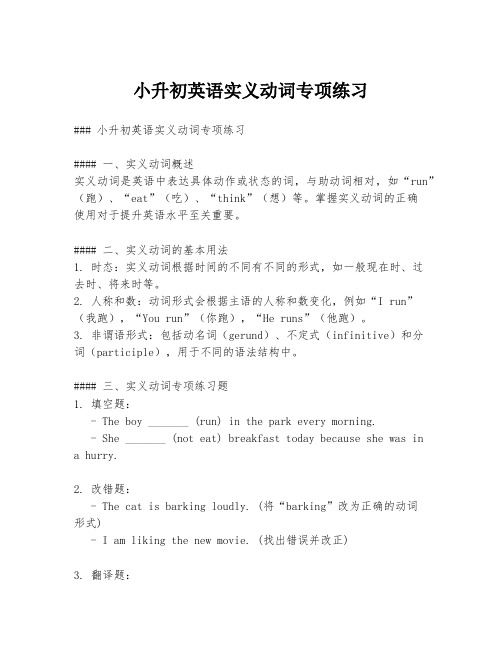
小升初英语实义动词专项练习### 小升初英语实义动词专项练习#### 一、实义动词概述实义动词是英语中表达具体动作或状态的词,与助动词相对,如“run”(跑)、“eat”(吃)、“think”(想)等。
掌握实义动词的正确使用对于提升英语水平至关重要。
#### 二、实义动词的基本用法1. 时态:实义动词根据时间的不同有不同的形式,如一般现在时、过去时、将来时等。
2. 人称和数:动词形式会根据主语的人称和数变化,例如“I run”(我跑),“You run”(你跑),“He runs”(他跑)。
3. 非谓语形式:包括动名词(gerund)、不定式(infinitive)和分词(participle),用于不同的语法结构中。
#### 三、实义动词专项练习题1. 填空题:- The boy _______ (run) in the park every morning.- She _______ (not eat) breakfast today because she was in a hurry.2. 改错题:- The cat is barking loudly. (将“barking”改为正确的动词形式)- I am liking the new movie. (找出错误并改正)3. 翻译题:- 他正在学习英语。
(翻译成英文)- The girl is reading a book. (翻译成中文)4. 选择题:- What _______ you _______ (do) when I called you?A. did; doB. are; doingC. were; doingD. do; doing5. 动词时态填空题:- I _______ (not see) the movie because I was at a meeting. - They _______ (go) to the beach last weekend.#### 四、答案解析1. 填空题:- The boy runs in the park every morning. (使用一般现在时) - She didn't eat breakfast today because she was in a hurry. (使用过去时)2. 改错题:- The cat is meowing loudly. (将“barking”改为“meowing”,因为猫是“喵喵叫”)- I like the new movie. (将“am liking”改为“like”,因为“like”是一般现在时的表达)3. 翻译题:- 他正在学习英语。
2023年中考英语备考实义动词练习题(附答案)

2023年中考英语备考实义动词练习题(附答案)一、单选题1.If a student is able to ________others what he's learnt from textbooks, it shows he has understood it well.A.post B.lend C.teach D.refuse2.—There is someone knocking at the door.—It must be the repairman. I ______ him to come to fix our fridge two hours ago.A.call B.have called C.called3.—Mother often warned Peter not to play on his phone in the street, but her warning fell on deaf ears.—Unfortunately, Peter was hit by a car and sent to hospital yesterday.A.was heard B.was agreed C.was not noticed4.—After seeing Snowflake Boy Manfu's picture, their class raised money for the poor children.—Yes, they organized a book fair on the playground and sold some books and CDs.A.collected B.put up C.brought up5.—I think the classroom needs _______.—Well, you are right.A.clean B.cleaning C.to be cleaning D.cleaned二、单词拼写(词汇运用)6.The teacher asked us to c the first report with the second to find their similarities and differences.7.Mike invited me to his birthday party, but I r politely at once because I was preparing for an exam.8.Mike breaks the school rules now and then, that is to say, he doesn't b well in school.9.It's our duty to save energy. Please r to turn off lights and computers when you leave the office.10.The children like to (装满) the bags with sand for fun.11.Confucius's ideas still (影响) Chinese a lot in modern China.12.The sky lanterns got smaller and smaller after it rose into the air. And finally it dand couldn't be seen.13.When I lose confidence, one of my best friends always e me not to give up. 14.She is happy to be invited to (参加) a school concert this weekend.15.I had c what kind of job I would like to do.16.In class, teachers often students into small groups to have discussions.17.We didn't(期待) there would be such a wonderful surprise.18.After a whole day's hard work, Susan took a quick shower,(躺) on the bed and fell asleep. 19.Beilun Library interests many people and (提供) them with many kinds of books. 20.COVID-19 is horrible. It is said that it has made more than two hundred thousand people ltheir lives.21.Mr Yang said he (更喜欢) reading paper books to e-books on the Internet. 22.The Chinese government has (提供) a lot of masks for people in thee past few months.23.Many people in western countries can hardly a(避免) buying products made in China. 24.—Where shall we go for the summer outing,Daniel?—I can't (记得)exactly, maybe somewhere near Babulo Valley.25.A good hobby a(增加) a lot of fun to our spare life.26.The stamp I bought yesterday(花费)me 20 yan.27.Teenagers should be (鼓励) to learn and spread Chinese traditional culture. 28.—Cindy, what kind of restaurants do you like?—I p restaurants that can provide customers with free Wi-Fi.29.Before travelling, my mother often (准备)everything well.30.Neil's coach gave him several suggestions to (避免)getting lost.31.My head teacher is a math teacher. He has t math for 20 years.32.Our government has made laws to (限制)air and water pollution.33.The paint hasn't been dry. Don't t the door.34.He often(借) books and magazines from the school library.三、语法填空35.Don't too much on your parents. Try to deal with problems yourselves. (independent) 36.Thomas Edison, one of the greatest inventors in the world, (create) over 1,000 things. 37.The price of this apartment is so high that Ms. Black can't (afford) it.38.High-speed trains passengers to cover the distance in no more than four hours.(able)四、翻译39.天空乌云密布,我们担心要下雨了。
实义动词的练习题

实义动词的练习题在学习语法时,实义动词是一个重要的部分。
通过练习实义动词的用法和含义,我们可以更好地掌握语言的运用。
下面,我将给大家提供一些实义动词的练习题,希望能帮助大家巩固所学知识。
练习题一:根据句子意思,选择适当的实义动词填空。
1. 我们应该努力__________自己的梦想,不要轻易放弃。
2. 在生活中,我们要学会__________他人,帮助他们解决困难。
3. 他经常__________书,增长自己的知识。
4. 我们应该__________对自己的行为负责,用正确的方式解决问题。
5. 当我们面对挫折时,我们应该__________勇气,不要轻易退缩。
练习题二:根据下列句子补全对话,使用适当的实义动词。
A: 你喜欢什么活动?B: 我喜欢户外运动,尤其是__________。
A: 那你经常在哪里__________?B: 我经常去附近的公园__________。
A: 你喜欢和朋友一起__________吗?B: 是的,和朋友一起__________更有趣。
练习题三:根据下列图片,描述图片中人物的活动,使用适当的实义动词。
1. 图片一:一个人正在__________,他表情很开心。
2. 图片二:一个人正在__________,他手里拿着一个画笔。
3. 图片三:一个人正在__________,他身上沾满泥巴。
练习题四:写一篇短文,描述自己每天的活动,使用适当的实义动词。
我每天早晨起床后,第一件事就是__________牙刷洗脸。
然后我会去__________早餐,喝一杯牛奶,吃一片面包。
接着,我将会__________公交车去学校。
在学校里,我会认真__________老师的讲解,和同学一起__________练习。
中午,我会去__________午饭,午饭过后我会找个地方__________一会儿。
下午,我会继续__________学习,做一些实验和练习。
放学后,我会和朋友们一起__________。
实义动词的练习 专题复习
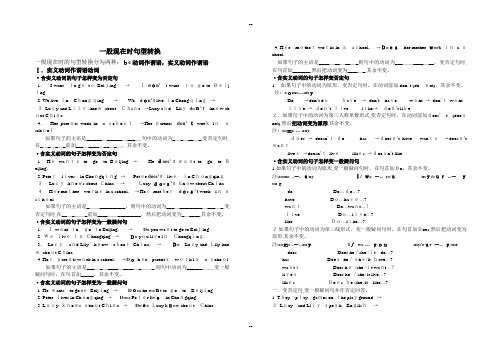
一般现在时句型转换一般现在时的句型转换分为两种:be动词作谓语,实义动词作谓语Ⅰ.实义动词作谓语动词·含实义动词的句子怎样变为否定句1.I wantto gotoBeijing. →Idon’t wanttogo to Beij ing.2. We live in Chongqing.→We don’ t live in Chongqing.→3. Lucy and LilyknowaboutChina.→Lucy and Lilydon’ t know ab out China.4.Her parents work in a school.→Her parents don’ tworkinaschool.如果句子的主语是__________________,句中的动词为________,变否定句时,在_______前加______________,其余不变。
·含实义动词的句子怎样变为否定句1.Hewantsto go to Beijing.→He does’ t want to go to Beijing.2. Peterlives in Chongqing.→Peter does’ t livein Chongqing.3.Lucyknows about China.→Lucy does’ tknow about China. 4.Her mother worksin a school.→Hermotherdoes’ t work inaschool.如果句子的主语是_____________,则句中的动词为___________________,变否定句时,在_______前加_______________,然后把动词变为______,其余不变。
·含实义动词的句子怎样变为一般疑问句1.Iwant togo to Beijing.→Do you want to go to Beijing.2. WeliveinChongqing.→Do you live inChongqing.3.Lucyand Lily know aboutChina.→Do Lucy and Lily kno wabout China.4. Herparents work in a school.→Doher parentswork in a school.如果句子的主语是____________________,则句中动词为________,变一般疑问句时,在句首加_____,其余不变。
实义动词知识点详解(初中英语专项复习)1

实义动词知识点详解(初中英语专项复习)一、实义动的分类实义动词是能独立作谓语的动词,又可称为行为动词,如work,study,run等。
按其句法作用分为及物动词和不及物动词;按其持续性分为延续性动词和短暂性动词。
1.及物动词及物动词本身意义不完整,后面要跟一个名词或代词等作宾语才能使其意思完整。
(1)动词十宾语。
Dick is watching TV.迪克正在看电视。
(2)动词十宾语十宾补。
We call her Linda.我们叫她琳达。
「注意]接省略to的不定式或现在分词作宾补的动词有:make,let,see,watch,have,hear,notice等(3)动词+间接宾语+直接宾语。
双宾语动词后面跟两个宾语,直接宾语为动词直接涉及的事物;间接宾语往往指涉及的人。
间接宾语有时可放到后面去,由介词to或for引导,变成介词短语。
My friend always gives me some old books.我的朋友经常给我一些旧书。
常见的带双宾语的动词有:带有方向性①能接以to引导的间接宾语的动词常见的有:bring,give,leave,lend,offer,pass,play,read,send,show,take,teach,tell,write等。
Could you lend your dictionary to me?请你把你的字典借我用下好吗?She passed the salt to him.她把盐递给了他。
②能接以for引导的间接宾语的动词常见的有:build,buy,cook,cut,fetch,find,get,keep,make,order,save,pick,play,sing,take,win,write等。
Mother cooks breakfast for us every day.母亲每天都为我们做早饭。
I'll fetch a chair for you.我去给你拿一把椅子。
实义动词的掌握程度 专题复习

实义动词的掌握程度专题复习
实义动词是指具有实际意义的词语,表示人、事物的行为、状态或特征。
掌握实义动词的使用可以使语言更加生动有力,增加表达的准确性和丰富性。
下面是一些掌握实义动词的重要要点和复建议:
1. 实义动词的基本特点和用法
- 实义动词是指能表示人、事物的动作、行为、状态或特征的动词。
- 实义动词可以单独构成句子的谓语,也可与其他成分进行搭配使用。
- 实义动词在句子中起到动态或静态的作用,用来描述人或事物的具体行为或状态。
2. 实义动词的分类
- 表示动作的实义动词,如跑、走、喝等。
- 表示状态的实义动词,如是、在、有等。
- 表示心理活动或感官的实义动词,如想、听、看等。
3. 实义动词的使用技巧
- 注意实义动词与叙述性动词的区别。
实义动词可以精确地描述动作、状态或特征,而叙述性动词则更多地用于叙述事实或表达观点。
- 根据语境和需要选择合适的实义动词,使句子形象生动,语言丰富多样。
- 注意实义动词的时态和语态的变化,以确保句子的语法准确性和时态一致性。
4. 实义动词的练方法
- 阅读相关语言材料,理解实义动词在不同句子中的应用和变化。
- 多做练题,提高对实义动词的认识和掌握程度。
- 跟随教材或参考资料的指导,进行口语或写作的练,积累实义动词的使用经验。
以上是对实义动词的掌握程度的专题复习,希望对您的学习有所帮助!。
实义动词练习(可编辑修改word版)

Be 动词和实义动词练习题一、写出下列单词的第三人称单数形式。
drink buy pass stay say watch make move brush look read teach come play catch plant help wash sit ask carry eat like flyrun go study begin do have二、用be 动词的适当形式填空。
1、My name Sam.I from the UK.2、It a tree.3、It an elephant.4、Linda and Rose good friends.5、you Mr.Wang?6、How many horses there on the farm.7、this a computer.8、What the weather like?9、Today Alice’s birthday?10、What your name?三、用do 或does 填空。
1、—you ride a bike after school?—Yes,I .2、—your sisiter like P.E?—No,she not.3、—What the students have?—They have some pens.4、—How Linda go to school?—She goes to school on foot.5、—He not speak English .He speaks Japanese.6、—they watch TV on Sundays?—Yes,they .7、My father and mother not read newspapers on Saturdays.8、Which season Miss Wang like best?9、Ted some housework today.10、—How many cars you see?—I see 15.四、用所给单词的适当形式填空。
实义动词(单选题 25题 含解析)初中英语专题练习(1)
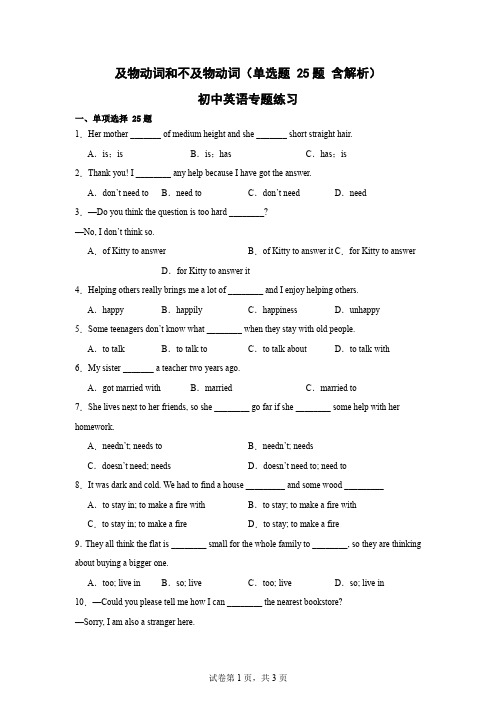
及物动词和不及物动词(单选题 25题含解析)初中英语专题练习一、单项选择 25题1.Her mother _______ of medium height and she _______ short straight hair.A.is;is B.is;has C.has;is2.Thank you! I ________ any help because I have got the answer.A.don’t need to B.need to C.don’t need D.need3.—Do you think the question is too hard ________?—No, I don’t think so.A.of Kitty to answer B.of Kitty to answer it C.for Kitty to answerD.for Kitty to answer it4.Helping others really brings me a lot of ________ and I enjoy helping others.A.happy B.happily C.happiness D.unhappy 5.Some teenagers don’t know what ________ when they stay with old people.A.to talk B.to talk to C.to talk about D.to talk with6.My sister _______ a teacher two years ago.A.got married with B.married C.married to7.She lives next to her friends, so she ________ go far if she ________ some help with her homework.A.needn’t; needs to B.needn’t; needsC.doesn’t need; needs D.doesn’t need to; need to8.It was dark and cold. We had to find a house _________ and some wood _________ A.to stay in; to make a fire with B.to stay; to make a fire withC.to stay in; to make a fire D.to stay; to make a fire9.They all think the flat is ________ small for the whole family to ________, so they are thinking about buying a bigger one.A.too; live in B.so; live C.too; live D.so; live in 10.—Could you please tell me how I can ________ the nearest bookstore?—Sorry, I am also a stranger here.A.arrive B.get C.reach at D.get to11.________ this photo.A.Look B.Look at C.See D.Looks 12.The football final will ________ at Moonlight Middle School next Sunday.A.take place B.take action C.hold13.The woman ________ two pairs of shoes to try on.A.showed me B.showed for me C.showed to D.showed to me 14.Could you please tell me the best place ________ on weekends?A.going B.to go to C.go to15.—Your new pants look cool.—Thanks. My dad ________.A.buy it for me B.buys them for me C.buys me them 16.With the help of the Internet, information can ________ every corner of the world quickly.A.reach B.land C.go D.arrive17.—I don’t know how to draw.—Don’t worry. I’ll show you ________.A.what to do B.what to do it C.how to do D.how to do it 18.—I always use QQ to chat with friends on the Internet.—Oh, really? Can you teach me ________?A.how can I use B.how I can use C.how to use it D.how to use 19.Please spell your name. (请判断句中划线部分的词性)A.名词B.动词C.形容词20.— Is there ________ with your eyes? They’re red.— Nothing ________ happened, I just couldn’t sleep well last night.A.something wrong; is B.anything wrong; hasC.anything wrong; is D.something wrong; has21.We should ________ the hotel after two o’clock in the afternoon.A.arrive B.arrive in C.arrive at D.get 22.When we ________, we can take photos at once.A.arrive B.arrive at C.get to D.reach23.Which of the following sentences has an intransitive verb (vi.)?A.Ice cream tastes nice.B.Farmers harvest crops.C.The temperature drops.D.Autumn leaves turn brown. 24.The boy ________ last Sunday.A.reached B.got C.arrived 25.Mozart had an amazing gift for art and his music is well worth ________.A.listened to B.listening C.to listen D.listening to参考答案:1.B【详解】句意:她母亲中等身高,她有一头短直发。
实义动词的运用方法 专题复习
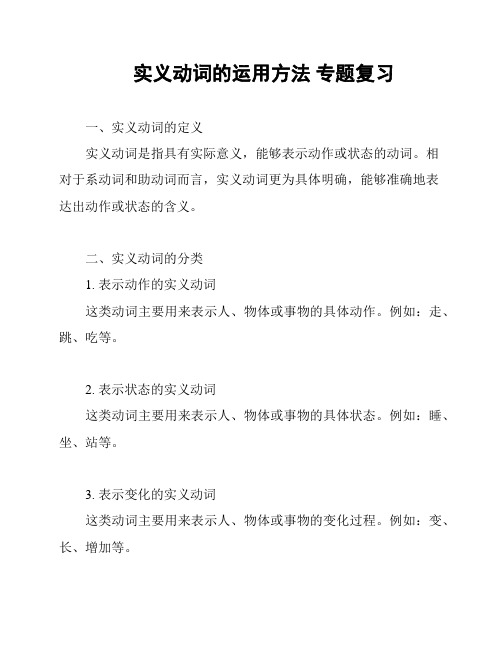
实义动词的运用方法专题复习一、实义动词的定义实义动词是指具有实际意义,能够表示动作或状态的动词。
相对于系动词和助动词而言,实义动词更为具体明确,能够准确地表达出动作或状态的含义。
二、实义动词的分类1. 表示动作的实义动词这类动词主要用来表示人、物体或事物的具体动作。
例如:走、跳、吃等。
2. 表示状态的实义动词这类动词主要用来表示人、物体或事物的具体状态。
例如:睡、坐、站等。
3. 表示变化的实义动词这类动词主要用来表示人、物体或事物的变化过程。
例如:变、长、增加等。
三、实义动词的运用方法1. 根据动作或状态选择合适的实义动词在使用实义动词时,要根据具体的动作或状态来选择合适的动词。
避免使用含义模糊或不准确的动词。
2. 使用具体明确的实义动词在表达动作或状态时,尽量使用具体明确的实义动词,以便更准确地传达所要表达的含义。
3. 注意时态和语态的变化在使用实义动词时,要根据需要灵活运用不同的时态和语态,以表达出准确的时间和动作关系。
4. 避免滥用实义动词在写作中,要避免过多滥用实义动词,尤其是在表达抽象概念或否定意义时,可以选择其他更合适的表达方式。
四、例句练1. 我们经常去公园散步。
(表示动作)2. 她现在正在睡觉。
(表示状态)3. 这个问题变得更加复杂了。
(表示变化)五、注意事项在运用实义动词时,要注意使用合适的语境、时态和语态,以确保表达的准确性和连贯性。
六、总结实义动词是具有实际意义的动词,能够准确地表达人、物体或事物的动作、状态和变化。
在运用实义动词时,要选择合适的动词,使用具体明确的词语,注意时态和语态的变化,并避免滥用实义动词。
实义动词(单选题 15题 含解析)中考英语专题练习

实义动词(单选题 15题含解析)中考英语专题练习一、单选题(共15题)1.I am afraid we can not ____ to take a taxi. Let's go by underground instead.A. refuseB. affordC. forgetD. fall2. The Boeing 737 of Cuba airline crashed(坠毁)in Havana on May 18,2018, which ____ more than 100 deaths.A. causedB. influencedC. forced3. If a student is able to ____ somebody else what he's learnt to from textbooks,it shows he's understood it well.A. postB. lendC. teach4. -Jack usually ____ to help at the underground station on weekends.--Cool! Let's join him next Saturday.A. offersB. refusesC. forgets5. -I can't find my mobile phone.-Don't worry. Maybe you ____ it at home.A. forgotB. missedC. lostD. left6.—Can I _____________ Robinson Crusoe? Mrs. Zhao.—Sure,it's very interesting,but you can only ______________it for two weeks.A.borrow;lend B.lend;borrowC.borrow;keep D.lend;keep7. It is necessary for schools to _____ the need of all the students' development.A. cutB. hideC. refuseD. satisfy8. -we can't enter the room. I can't find my key.-Is it possible that you ____ it at home?A. leftB. fixedC. managedD. designed9. While travelling in a strange place,you'd better ____ the local people and follow their customs (习俗).A. watchB. changeC. controlD. teach10. -Jack hasn't taken his piano lessons for a long time.--He is considering ____ his piano course and spending more time on his study.A.to dropB.to throwC. droppingD. throwing11. -Dad,I'll be in the final singing competition tomorrow.-Be careful not to get a sore throat and ____ your voice.A. loseB. raiseC. dropD. break12. -Time will ___ whether I made the right choice or not.-I believe you can succeed.A. seeB. sayC. knowD.tell13. -What does the instruction say?-The colors in the dress will ____ if you use hot water.A. fallB. appearC. run14. -Why don't you choose the red tie?--For me,it doesn't ____ my shirt very well.A. fixB. acceptC. compareD. match15. Dreams are beautiful. However,to____ them needs lots of time and work.A. discoverB. findC. achieveD. stop【参考答案】一、单选题(共15题)1.B 解析:句意:我担心我们坐不起出租车,咱们改坐地铁吧。
实义动词的应用 专题复习

实义动词的应用专题复习实义动词是指具有实际含义和动作特征的动词。
在语法中,实义动词在句子中担任动作的核心,并表达具体的动作或状态。
在本次专题复中,我们将回顾实义动词的基本概念和应用。
1. 实义动词的定义和特点实义动词是指能够表达具体动作或状态的词语。
它们和虚拟动词相对,虚拟动词主要用于构成句子的谓语,但没有实际的动作或状态含义。
实义动词具有以下特点:- 可以表示真实的、具体的动作或状态;- 可以带有时态、语态、人称和数的变化。
2. 实义动词的分类实义动词可以根据其功能和意义进行分类。
以下是主要的实义动词分类:2.1. 行为动词行为动词是指表示人或物的具体动作的动词。
例如:跑、吃、写等。
行为动词可以进一步分为及物动词和不及物动词。
及物动词需要有宾语来接受动作的影响,而不及物动词不需要宾语。
2.2. 感官动词感官动词是指表示感觉和感知的动词。
例如:看、听、闻等。
感官动词主要用于表达人的感受和体验。
2.3. 状态动词状态动词是指表示某种状态或性质的动词。
例如:是、变成、存在等。
状态动词主要用于描述主语的状态或属性。
2.4. 变化动词变化动词是指表示变化的动词。
例如:变化、增加、减少等。
变化动词用于表达数量、大小、程度等的变化。
3. 实义动词的应用实义动词在语言表达中起到非常重要的作用。
它们可以帮助准确描述和表达动作、状态、行为和感官等方面。
实义动词用于构成句子的谓语,与主语和宾语一起形成完整的句子结构。
在实义动词的应用中,需要注意以下几点:- 选择恰当的实义动词,以准确表达想要表达的动作或状态;- 考虑时态、语态、人称和数的变化,以确保动词和上下文的一致性;- 在需要转换语态时,注意及物动词的宾语变为主语,不及物动词没有宾语。
4. 实义动词的练题以下是一些实义动词的练题,供大家复和巩固知识:1. 请用适当的实义动词填空:他每天早上都会 __起床__。
2. 请用适当的实义动词填空:她 __看__ 了一本有趣的书。
初中英语 实义动词 强化练习(附答案)
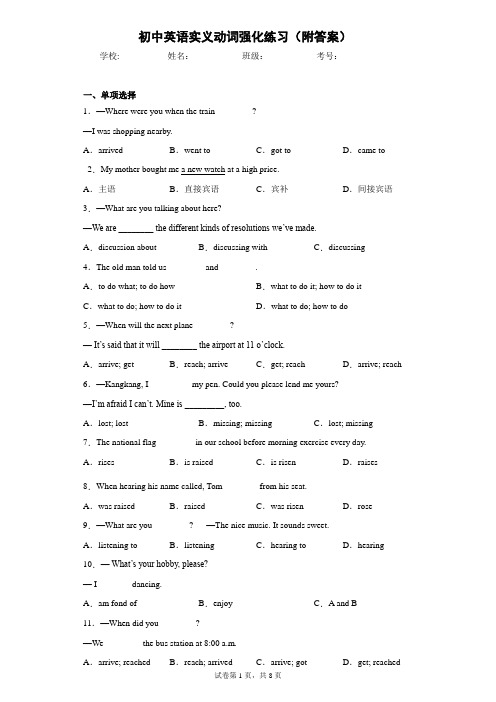
初中英语实义动词强化练习(附答案)学校:___________姓名:___________班级:___________考号:___________一、单项选择1.—Where were you when the train ________?—I was shopping nearby.A.arrived B.went to C.got to D.came to 2.My mother bought me a new watch at a high price.A.主语B.直接宾语C.宾补D.间接宾语3.—What are you talking about here?—We are ________ the different kinds of resolutions we’ve made.A.discussion about B.discussing with C.discussing4.The old man told us ________ and ________.A.to do what; to do how B.what to do it; how to do itC.what to do; how to do it D.what to do; how to do5.—When will the next plane ________?—It’s said that it will ________ the airport at 11 o’clock.A.arrive; get B.reach; arrive C.get; reach D.arrive; reach 6.—Kangkang, I _________ my pen. Could you please lend me yours?—I’m afraid I can’t. Mine is _________, too.A.lost; lost B.missing; missing C.lost; missing 7.The national flag ________ in our school before morning exercise every day. A.rises B.is raised C.is risen D.raises 8.When hearing his name called, Tom ________from his seat.A.was raised B.raised C.was risen D.rose 9.—What are you ________? —The nice music. It sounds sweet.A.listening to B.listening C.hearing to D.hearing 10.—What’s your hobby, please?— I _______ dancing.A.am fond of B.enjoy C.A and B 11.—When did you ________?—We ________ the bus station at 8:00 a.m.A.arrive; reached B.reach; arrived C.arrive; got D.get; reached12.—My parents will visit me soon.—When will they ________?A.get to B.arrive at C.arrive D.reach 13.―Hurry up and we can ________ before lunchtime.―OK, let’s try to ________ the hall early to cheer for the movie star.A.arrive; arrive B.reach; reach C.get; arrive at D.arrive; reach 14.—Do you know when your mother ________ your father?—Yes. In spring, 2002.A.got married B.has been married C.married D.has been married to15.The classroom buildings in our school ________five floors.A.is B.has C.have D.are 16.My father gave me fifteen yuan to buy an English dictionary.A.宾补B.状语C.间宾D.直宾17.Dear little boy, don’t make noise. I ________ the piece of music.A.listening B.am listening C.am listening to D.is listening 18.________ this photo, please. Can you ________ the cute dog in it?A.Look, see B.Look at, look C.Look at, see D.See, look at 19.I’m new at the party and I don’t have a friend ________.A.to talk to B.talking to C.to talk D.speaking to 20.—What do you think of his speech?—Excellent. It is ________ worth ________.A.very; listening to B.well; listen C.well; listening to D.very; listen 21.If a girl doesn’t know ________ to wear or ________ to dress up, she can ask her best friend for help.A.what, how B.what, what C.how, what D.how, how 22.—________, can you ________ anything?—Sorry, I can’t.A.Listen; hear B.Hear; listen C.Listen; listen D.Hear; hear 23.I saw Bill ________ the room quietly and sit behind the door.A.enter B.entering C.come D.enter into 24.—A long journey can be covered only by taking one step at a time.—I agree. All small thing can ________ and become big things.A.add up B.set up C.show up D.get up 25.A few days ago, a director performed a break dance for students to ________ some of their pressures.A.remind B.refuse C.require D.reduce 26.We all know that Anti-Japanese War ________ in 1937 and ________ for eight years. A.broken out; was lasted B.was broken; lastedC.was broken out; was lasted D.broke out; lasted27.We must ________ if we want to win the match tomorrow.A.get together B.pull together C.get up D.give up 28.—When did the visitors ________ the Science and Technology Museum?—They ________ this morning.A.reach; arrived B.get to; arrived at C.arrive in; reached D.arrive at; reached29.A man who does not ________ others can’t hope to achieve much.A.learn from B.come from C.get from D.take from 30.Chinese English learners often start to talk about topics in English but_________ up in Chinese.A.use B.end C.pick D.ends 31.—MADE IN CHINA is more and more popular all over the world.—Yeah! Many countries can hardly avoid ________ products made in China for people now.A.to provide B.offering C.to offer D.providing 32.Well, boys and girls, listen to the rule carefully: Don’t go over the line, or your throw won’t ________.A.count B.offer C.include D.support 33.—When will Mr. Wang ________ Beijing?—Next month.A.get B.reach C.arrive D.come 34.—Don’t go out at night, Jack. I’ll _______ you.— _________, Mom. I’m no longer a child.A.worry, Don’t worry B.worried about, Don’t worryC.be worried about, Don’t worry about D.be worried about, Don’t worry 35.—Do you know the Statue of Liberty in the USA?—Yes. It ________ New York Harbor.A.stands in B.stands for C.stands up D.stands 36._________ crowded Suzhou Center is! The number of customers has kept _________ greatly since last May.A.What a; rising B.How a; raising C.How; rising D.What; raising 37.For some students, it's difficult __________ school.A.to get to B.get to C.to get D.gets38.I ___________ work in the morning and __________ home in the afternoon. A.go; get B.go to; get C.go to; get to D.go; get to 39.The girl likes to________music.A.listen B.listen to C.listens D.listens to 40.She ________ China with her parents.A.live B.lives in C.live in41.Look, the whole family are discussing ________ for the birthday party.A.about what to buy B.to buy what C.about to buy what D.what to buy 42.—How did you find the film yesterday evening?—Just so so. It ________ pace.A.lacked in B.lacked C.was lacking D.was lacked in 43.We all know that the Anti-Japanese War ________ in 1931 and ________ for fourteen years.A.was broken out; was lasted B.was broken out; lastedC.broke out; was lasted D.broke out; lasted44.Mary is a good student. She ________ her lessons.A.all likes B.is like all C.is all likes D.likes all 45.There is a storybook. Please ________.A.show it her B.show it to herC.show her it D.show her to it46.Linda ________ tall and she ________ long curly hair.A.has; is B.has; has C.is; is D.is; has 47.Let’s ________ the zoo. I want ________ the tigers.A.go; see B.go to; to see C.to go; see D.to go; to see 48.What ________? You are so sad!A.happening B.happen to C.happened D.happened to49.Our teacher ________ his voice to make himself heard.A.rise B.raise C.rose D.raised 50.________ his father, he ________ reading a history book.A.Like; like B.Likes; likes C.Likes; like D.Like; likes 51.— Is that Tina?—No, it isn’t. Tina tall and a round face.A.is; is B.has; has C.is; has D.has; is 52.She a mother to me. So I her very much.A.likes; like B.is like; like C.likes; am like D.is like; am like 53.You ______ warm clothes in Shanghai, for it's quite hot this month there.A.needn't to wear B.needn't wearing C.don't need to wear 54.He ________ his hometown after he graduated from Tsinghua University.A.came back B.went back C.returned D.returned to 55.Kate’s mom gave her warm arms to sleep __________ the night when she was a baby. A.and B.about C.by D.in56.The dragon ________ an important part in Chinese festivalsA.takes B.plays C.has D.act57.All the flowers have come out. The sweet smell ________ the whole room and makes me comfortable.A.rushes B.fills C.covers D.spreads 58.Not only the students but also their teacher ________ the film.A.is looking B.are looking C.is enjoying D.are enjoying 59.Here is a letter. Please give _________.A.him B.him it C.it to him 60.Please find a room for us ________ this evening.A.to stay B.staying C.to staying D.to stay in 61.—Thank you for _____ me. —You are welcome.A.helping B.listening C.help62.We can’t _________ that room because the sign on the door says, “Staff Only”.A.go B.come C.enter D.arrive 63.— Why not ________ John a toy car for his birthday?— Good idea! He is crazy about cars.A.buy B.buying C.to buy D.buys64.Mr. Black is strong enough to move this heavy box. He __________ any help. A.doesn't need B.needn't to C.needn't D.doesn't need to 65.Mike promised________ his teacher carelessly.A.to listen to B.listening C.not listening D.not to listen to 66.— Have the astronauts________the moon safely?— Yes. Now they are working on the moon.A.gotten B.arrived C.reached to D.reached 67.This box seems _____ for us to__________ .A.light enough; carry B.enough light; carry itC.easily enough; carry it D.enough easily; carry68.Boys and girls, how can we lean English well is the useful topic ________today. A.to talk B.to talk with C.to talk about 69.—Be careful when you go ________ the street.—Thanks, I will look left and right before I________the road.A.cross; cross B.across; cross C.cross; across D.across; across 70.I bought my mother some flowers on Mother's Day.A.直接宾语B.间接宾语C.表语D.状语71.— Where do your grandparents ________?— They ________the town centre near a hospital.A.live; live B.live in; live C.live in; live in D.live; live in 72.—It’s 12 years since Wenchuan had that ter rible earthquake.—Time flies! Now great changes have _________ during the past 12 years. A.happened B.been happened C.taken place D.been taken place73.The students ________/grəu/ trees in the park every year.A.green B.grow C.great D.group 74.This kind of fruit salad ________ delicious. I'm sure it ________ well.A.is tasted; is sold B.tastes; is soldC.is tasted; sells D.tastes; sells75.Many Chinese characters symbolise their meanings, unlike English words which are spelt out according to how they sound.The underlined word “symbolise” in the sentence is a(n) ________.A.noun B.verb C.adjective D.adverb76.—No one can tell when they ________.—When they ________, I’ll l et you know at once.A.return; will arrive B.will return; reach C.will return; arrive 77.He ________ short and ________ blonde hair.A.is; has B.is; is C.has; is D.has; has 78.Please don’t make too much noise. I want to ________ the news G20 is coming. A.listen B.hear C.listen to D.hear from 79.Go downstairs, and ________ in line on the playground as soon as possible.A.to stand B.standing C.stand D.stands 80.Simon________ his homework at school.A.don’t do B.do C.doesn’t do D.doesn’t 81.关于句子They were offered something to eat as soon as they arrived at the shelter.,说法正确的是_________.A.offered的发出者是they B.to eat是定语C.arrive是及物动词,可以接宾语D.as soon as引导的是定语从句82.The man________from his seat and________a difficult question.A.raises; to rise B.raised; rose C.rises; to raise D.rose; raised 83.Which of the following sentences is right?A.Jack explained to us why he was so angry. B.Be a volunteer is a good experience for him.C.I don't know how to do first about my English. D.Please call me up as soon as you will get the result.84.Located beside Hangzhou's beautiful West Lake, a new private university will _______ soonA.rise B.raise C.be risen D.be raised 85.As we all know, the Anti-Japanese War ________ in 1937, and ________ for eight years.A.was broken out; lasted B.broke into;lastedC.broke out; was lasted D.broke out;lasted86.Please ________ why you are late for class again.A.explain it to me B.explain it me C.explain to me D.explain me 87.He ________ of medium build and he ________ curly brown hair.A.is; has B.has; is C.is; is D.has; has88.— Peter, __________the flower. — Wow, it __________so beautiful.A.looks; looks at B.looks at; looks C.look; looks at D.look at; looks 89.—Do you think that he________ talk to his teacher?—Yes. Sharing ideas is really important.A.can B.could C.needs D.needs to 90.He wants to be a doctor ________ his parents want him to _______ the army. A.while, join B.when; join C.while; join in D.when; join in 91.The doctor________us________an apple a day.A.advice; to eat B.advises; eat C.advises; to eat 92.He used to________short and________ short hair when he was young.A.have; be B.be; have C.be; be D.have; have 93.Could you please ________ the window? It’s cold outside now.A.not open B.not to open C.not opening D.not to opening 94.This is Tom's book,please give ________ .A.him it B.it him C.him to it D.it to him. 95.Amy and her best friend often________books together.A.read B.reads C.look D.looks 96.Excuse me, do you have a single room for me _____.A.to live in B.to live C.living in D.living 97.–you tell Molly to call me back?--Sure, no problem.A.Need B.Can C.Should D.Must 98.Peter ________ any money from his parents because he has found a good job. A.needn’t B.doesn’t need C.doesn’t need to D.don’t need to 99.Which of the following sentences is RIGHT?A.I’m not sure that he will come back in 2 days.B.Could you tell me which is the way to the hospital?C.He asked me what I will do the next day.D.Daniel doesn’t know whom he should talk.100.—How do you like the poem ? —It’s a bit too long, but anyway, it________well. A.reads B.is read C.is reading D.has read参考答案1.A 2.B 3.C 4.C 5.D 6.C 7.B 8.D 9.A 10.C 11.A 12.C 13.D 14.C 15.C 16.D 17.C 18.C 19.A 20.C 21.A 22.A 23.A 24.A 25.D 26.D 27.B 28.A 29.A 30.B 31.D 32.A33.B34.D35.A36.C37.A38.B39.B40.B41.D42.B43.D44.D45.B46.D47.B48.C49.D50.D51.C52.B53.C54.D55.D56.B57.B58.C59.C60.D61.A62.C63.A64.A65.D66.D67.A68.C69.B70.B71.D72.C73.B74.D75.B76.C77.A78.C79.C80.C81.B82.D83.A84.A85.D86.C87.A88.D89.D90.A91.C92.B93.A94.D95.A96.A97.B98.B99.B100.A答案第1页,共1页。
初中英语实义动词专项训练题加答案
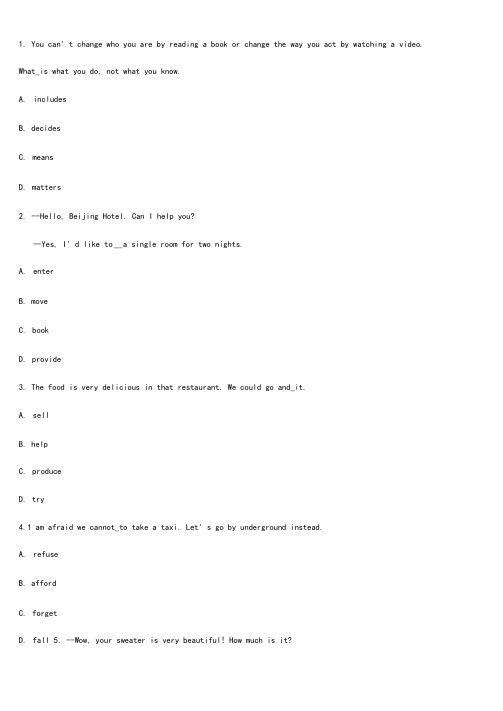
1.You can' t change who you are by reading a book or change the way you act by watching a video. What_is what you do, not what you know.A.includesB.decidesC.meansD.matters2.--Hello, Beijing Hotel. Can I help you?--Yes, I' d like to __ a single room for two nights.A.enterB.moveC.bookD.provide3. The food is very delicious in that restaurant. We could go and_it.A.sellB.helpC.produceD.try4.1 am afraid we cannot_to take a taxi. Let' s go by underground instead.A.refuseB.affordC.forgetD.fall 5. --Wow, your sweater is very beautiful! How much is it?A. spendB. paidC. costD. take6.1 know what you are thinking about. I can_your mind from the look on your face.A. stayB. spareC. readD. attend解析:句意---你不能通过阅读一本书来改变你的身份,也不能通过看一段视频来改变你的行为方式,重要的是你做什么,而不是你懂得什么。
matter作为不及物动词,意为"重要",故答案为D项。
2.答案:C解析:句意---您好,这里是北京旅馆。
- 1、下载文档前请自行甄别文档内容的完整性,平台不提供额外的编辑、内容补充、找答案等附加服务。
- 2、"仅部分预览"的文档,不可在线预览部分如存在完整性等问题,可反馈申请退款(可完整预览的文档不适用该条件!)。
- 3、如文档侵犯您的权益,请联系客服反馈,我们会尽快为您处理(人工客服工作时间:9:00-18:30)。
一般现在时句型转换一般现在时的句型转换分为两种:be动词作谓语,实义动词作谓语Ⅰ.实义动词作谓语动词·含实义动词的句子怎样变为否定句1. I want to go to Beijing. → I don’ t want to go to Beijing.2. We live in Chongqing. → We don’ t live in Chongqing. →3. Lucy and Lily know about China. →Lucy and Lily don’ t know about China.4. Her parents work in a school. →Her parents don’ t work in a school.如果句子的主语是__________________,句中的动词为________,变否定句时,在_______前加______________,其余不变。
·含实义动词的句子怎样变为否定句1. He wants to go to Beijing. → He does’ t want to go to Beijing.2. Peter lives in Chongqing. → Peter does’ t live in Chongqing.3. Lucy knows about China. → Lucy does’ t know about China.4. Her mother works in a school. →Her mother does’ t work in a school.如果句子的主语是_____________,则句中的动词为___________________,变否定句时,在_______前加_______________,然后把动词变为______,其余不变。
·含实义动词的句子怎样变为一般疑问句1. I want to go to Beijing. →Do you want to go to Beijing.2. We live in Chongqing. →Do you live in Chongqing.3. Lucy and Lily know about China. →Do Lucy and Lily know about China.4. Her parents work in a school. →Do her parents work in a school.如果句子的主语是____________________,则句中动词为________,变一般疑问句时,在句首加_____,其余不变。
·含实义动词的句子怎样变为一般疑问句1. He wants to go to Beijing. →Does he want to go to Beijing.2. Peter lives in Chongqing. →Does Peter live in Chongqing.3. Lucy knows about China. →Does Lucy know about China.4. Her mother works in a school. →Does her mother work in a school.如果句子的主语是____________则句中的动词为____________,变否定句时,在句首加_______,然后把动词变为______,其余不变。
·含实义动词的句子怎样变否定句1.如果句子中的动词为原形,变否定句时,在动词前加don’ t (do not),其余不变。
注:some---anyDo →don’t do have → don’t have want → don’t wantlive → don’t live like→ don’t like2.如果句子中的动词为第三人称单数形式,变否定句时,在动词前加does’t (does not),然后把动词变为原形,其余不变。
注:some --- anydoes → doesn’t do has →doesn’t have wants →doesn’t want lives →doesn’t live likes →doesn’t like·含实义动词的句子怎样变一般疑问句1.如果句子中的动词为原形,变一般疑问句时,在句首加Do,其余不变。
注:some --- any I/ we --- you my/our --- yourdo Do…do…have Do…have…want Do…want…live Do…live…like Do…like…2.如果句子中的动词为单三线形式,变一般疑问句时,在句首加Does,然后把动词变为原形,其余不变。
注:some --- any I/ we --- you my/our --- yourdoes Does he/she /it do…has Does he/she/it have…wants Does he /she /it want…lives Does he /she/ it live…likes Does he /she /it like…一.变否定句,变一般疑问句并作否定回答。
1. They play games on the playground. →2. Lucy and Lily speak English. →3. My classmates get up at 7:00. →4. He walks to school. →5. Jane goes to school by bike. →6. Kangkang helps me study English. →Ⅱ.be动词作谓语动词·含be动词的句子变否定句’m a student. → I’m not a student.is in Class2,Grade7. →He isn’t a studentand Tony are good friends. →Tom and Tony aren’t good friends.含有be动词的句子,变否定句直接在________后加_________,句子其他成分_________。
而且,be和_________可以缩写,只有_______和_______不能缩写。
·含be动词的句子变一般疑问句’m a student. →Are you a studentis in Class2,Grade7. →Is he in Class2,Grade7and Tony are good friends. →Are Tom and Tony good friends含有be动词的句子,变一般疑问句直接将________提到句首,句子其他成分_________。
但应注意人称转换,___________转换成___________________________。
Ⅲ.对划线部分提问(变特殊疑问句)1)分析句意,将划线部分去掉。
2)特殊疑问词有what,where,who,when,which,why,whose,how,how much,how many,how old,……具体用什么疑问词,须看划线部分是什么(如:是地点,就用where,是时间就用when,是人就用who……)3)特殊疑问句=特殊疑问词+一般疑问句have lunch at 12:00. → When do you have lunchbike is over there. → Where is her bikebike is over there. → Whose bike is over therebike is over there. → What is over therefather is 43. → How old is your fatherⅣ.完成下列句型转换练习watches TV every evening.(改为否定句)_________________________do my homework every day.(改为一般疑问句,并作否定回答)________________________________________________________3. She likes milk.(改为一般疑问句,并作肯定回答)___________________________4. Amy likes playing computer games.(改为一般疑问句,并作否定回答)___________________________________________________go to school every morning.(改为否定句)____________________________6. He speaks English very well.(改为否定句)________________________7. I like taking photos in the park.(对划线部分提问)__________________________8. John comes from Canada.(对划线部分提问)____________________________9. She is always a good student.(改为一般疑问句,作否定回答)________________________________________________________10. Simon and Daniel like going skating.(改为否定句)_____________________________________________________________________11. Do you often play football after school (肯定回答) _______________12. I have many books. (改为否定句)_________________________13. Gao Shan's sister likes playing table tennis.(改为否定句)_________________14. She lives in a small town near New York. (改为一般疑问句)_________________15. I watch TV every day. (改为一般疑问句)___________________________17. We have four lessons.(改为否定句)____________________________18. Nancy doesn't run fast. (改为肯定句)_________________________19. My dog runs fast. 否定句:_________________________________一般疑问句:________________________________20. Mike has two letters for him.一般疑问句:_______________________________________否定句:__________________________________________ 21. I usually play football on Friday afternoon.否定句: __________________________________一般疑问句: _________________________________________划线提问________________________________22. Sun Yang usually washes some clothes on Saturday.否定句: __________________________________________________一般疑问句: _____________________________________________划线提问: _______________________________________________23. Mingming usually waters the flowers every day.否定句: _____________________________一般疑问句: _____________________________划线提问 ____________________________________24. Tom does his homework at home.否定句: _______________________________________一般疑问句: ____________________________________划线提问_______________________________________man in a white shirt is my father.否定句:__________________________________________一般疑问句:_______________________________________________对划线部分提问:________________________________________________26.对下列相同句子的不同部分提问。
